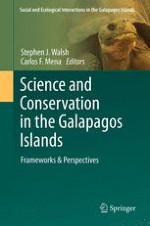2013 | OriginalPaper | Buchkapitel
4. The Socioeconomic Paradox of Galapagos
verfasst von : Byron Villacis, Daniela Carrillo
Erschienen in: Science and Conservation in the Galapagos Islands
Verlag: Springer New York
Aktivieren Sie unsere intelligente Suche, um passende Fachinhalte oder Patente zu finden.
Wählen Sie Textabschnitte aus um mit Künstlicher Intelligenz passenden Patente zu finden. powered by
Markieren Sie Textabschnitte, um KI-gestützt weitere passende Inhalte zu finden. powered by
